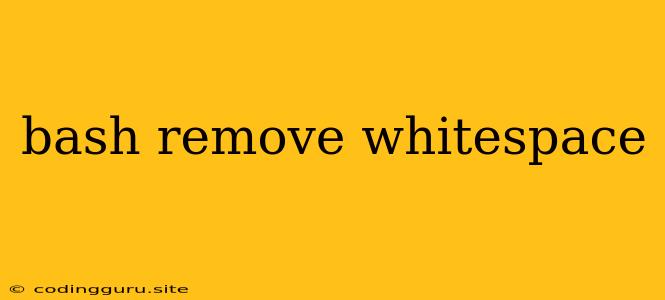How to Remove Whitespace in Bash
Whitespace, those pesky spaces and tabs, can wreak havoc on your scripts and data manipulation. Luckily, Bash provides several powerful tools to tackle this common problem.
So, how do you remove whitespace in Bash?
1. The tr Command:
The tr command is a versatile tool that allows you to translate characters. To remove whitespace, you can use the following:
echo " This string has extra whitespace " | tr -d '[:space:]'
This command will output:
Thisstringhasextrawhitespace
Explanation:
echoprints the input string with whitespace.|pipes the output to thetrcommand.-dinstructstrto delete characters.'[:space:]'specifies the character class representing all whitespace characters (spaces, tabs, newlines).
2. The sed Command:
Another powerful tool for text manipulation is sed. To remove whitespace with sed, you can use:
echo " This string has extra whitespace " | sed 's/[[:space:]]//g'
This command will also output:
Thisstringhasextrawhitespace
Explanation:
echoprints the input string with whitespace.|pipes the output to thesedcommand.'s/[[:space:]]//g'substitutes all whitespace characters ([[:space:]]) with nothing (//). Thegflag ensures all occurrences are replaced.
3. The grep Command:
While primarily used for searching, grep can also be used to remove whitespace. Here's an example:
echo " This string has extra whitespace " | grep -o '[^[:space:]]*'
Output:
This
string
has
extra
whitespace
Explanation:
echoprints the input string with whitespace.|pipes the output to thegrepcommand.-ooutputs only the matched part.'[^[:space:]]*'matches any character that is not whitespace ([^[:space:]]) zero or more times (*). This will extract each word separately.
4. Parameter Expansion:
Bash provides parameter expansion to manipulate strings. To remove leading and trailing whitespace from a variable, you can use:
my_string=" This string has extra whitespace "
trimmed_string="${my_string# }" # Remove leading whitespace
trimmed_string="${trimmed_string% }" # Remove trailing whitespace
echo "$trimmed_string"
Output:
This string has extra whitespace
Explanation:
#removes the shortest prefix matching the pattern.%removes the shortest suffix matching the pattern.
Tips:
- Use single quotes around your regular expressions to prevent shell expansion.
- The
-rflag insedallows you to use basic regular expressions. - For more complex text manipulation, consider using
awkorperl.
Choosing the Right Method:
The best method for removing whitespace depends on your specific needs and the context.
tris efficient for simple whitespace removal.sedis more flexible and powerful for complex substitutions.grepis useful for extracting non-whitespace elements.- Parameter expansion is ideal for removing leading and trailing whitespace from variables.
Conclusion:
Removing whitespace in Bash is a common task, and there are several effective methods to accomplish this. Whether you need to clean up data, prepare input for another command, or simply improve the readability of your output, the tools discussed in this article can help you achieve your goals.
